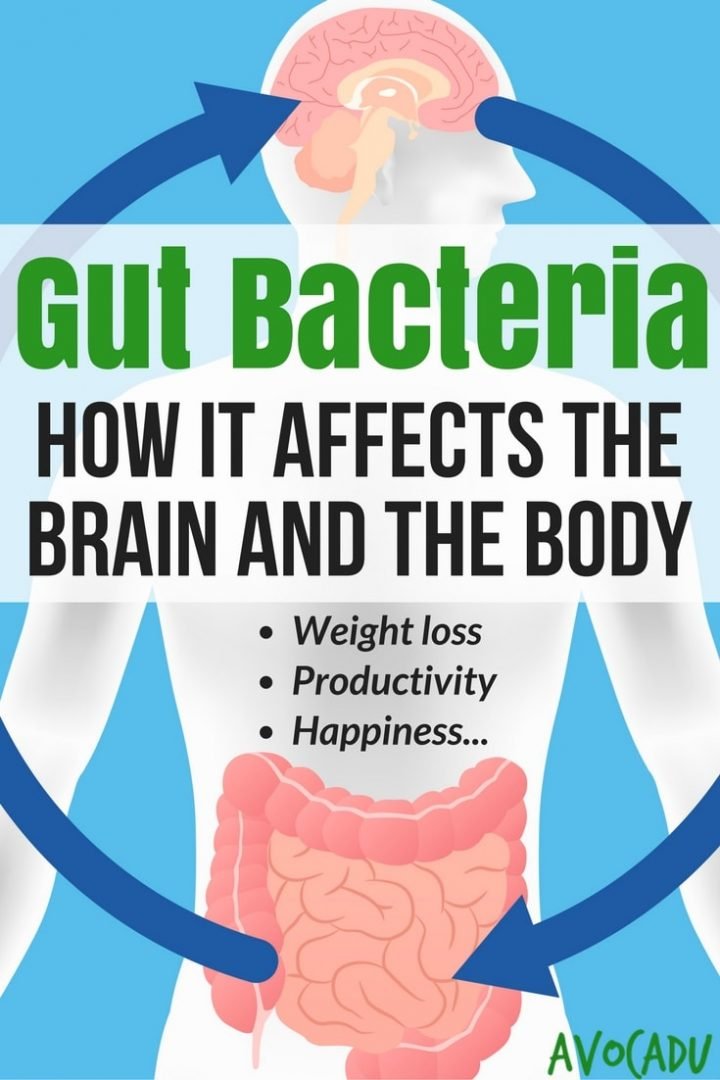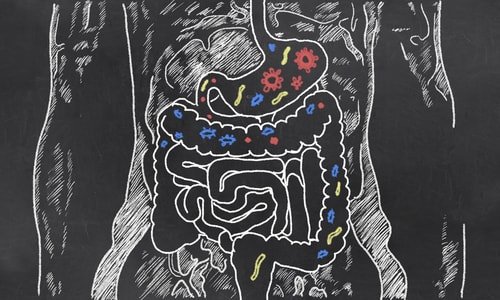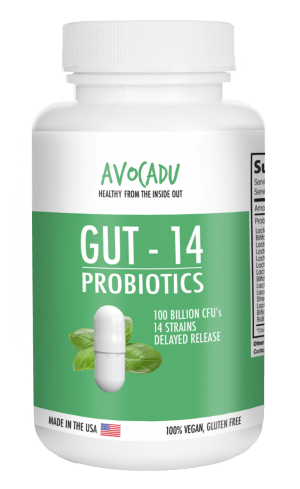Hey readers! Today we’re going to talk about how gut bacteria affects the brain and the body! We’ll also cover how to get your gut healthy again!

The saying “You are what you eat” may mean more than you’ve always thought.
You’ve heard that you should eat healthy. You may even watch your calories so that you don’t gain weight.
However, did you know that food can affect more than your weight and your physical health? It plays a big part in helping you maintain healthy gut bacteria.
A healthy balance of bacteria in your intestines can affect everything from your body to your brain, including some unlikely things such as your mood, productivity, and happiness!
And it may be the main culprit in why you aren’t losing weight when you seem to be doing all the right things!
How Gut Bacteria Affects the Brain and the Body
Did You Know That Your Gut Acts Like a Brain?
Experts sometimes refer to the digestive tract as the second brain. It’s really the enteric nervous system (ENS).
The ENS runs from your esophagus to your rectum. It’s lined with more than 100 million nerve cells.
While the ENS isn’t capable of thinking in the same manner as your cerebrum, it does communicate with your main brain. Researchers are finding that some bodily functions that they previously thought were regulated by your main brain may actually begin in your ENS.
It’s the microbes in your gut that process the foods you eat, synthesize vitamins and communicate with your central nervous system.
Gut bacteria affects not only your health but also your mood and cognition.
The nerve signals, hormones and bacteria in the gut are all responsible for sending signals from the ENS to the rest of the nervous system.
Your Gut Releases its Own Feel-Good Neurotransmitters
The vagus nerve connects the nerves in the digestive system to different areas of the brain. Neurotransmitters are the chemicals that create signals for neural communication.
According to researchers, some types of bacteria in the gut create serotonin. Serotonin is known to regulate mood and appetite when it is released in the brain (1).
Serotonin also contributes to happiness and wellbeing, and low serotonin levels are linked with depression.
Scientists aren’t sure what happens when serotonin is released in the gut, because serotonin cannot cross the blood-brain barrier to affect your mood. They theorize that serotonin stimulates the vagus nerve to send signals to the brain that affect hunger and mood, however.
Digestive Disorders Are Linked With Anxiety and Depression

According to experts at John’s Hopkins, people who suffer from irritable bowel syndrome (IBS), constipation, diarrhea, bloating and other digestive issues may be more likely to experience anxiety and depression (2).
It was once thought that people with mood disorders reported digestive distress more often. Now, researchers have found that if your gut is in distress, it communicates with the central nervous system, triggering mood changes.
In one experiment, researchers gave some subjects a prebiotic that encouraged the growth of Lactobaccilus and Bifidobacteria in the gut. The individuals who took the prebiotic had lower cortisol levels during a test that measures stress (3).
In another study, a group of subjects who ate yogurt containing live active cultures of bacteria responded more calmly to images of emotional facial expressions than the control group.
Medications that are often prescribed for mood disorders, like antidepressants, may also work to alleviate the symptoms of irritable bowel syndrome. On the other hand, creating a healthy gut environment can help the body produce more of the transmitters dopamine, serotonin and GABA, which help regulate mood.
Watch this Mark’s Daily Apple video for more information about how gut bacteria affect mental health.
Gut Bacteria Can Predispose You to Weight Gain
The 10 trillion microbes that live in the body are called the microbiome. The majority of these live in the digestive system.
Different bacteria are linked to different health characteristics. Researchers have found specifically that obese individuals have different microbiota than lean people (4).
In one study, researchers implanted some mice with bacteria from the gut of an obese woman and other mice with bacteria from the gut of her lean twin sister. Although they ate the same diet, the mice with the bacteria from the obese sister gained more weight than the other mice.
This study also led researchers to realize that the regulation of our body’s systems may not stem only from the brain. Some communication may start with the gut.
Imbalanced Gut Bacteria Can Make You Feel Foggy
Have you ever just felt off? You can’t necessarily explain why, but you leave your car keys in the refrigerator and forget what you’re doing as you’re doing it?
It could be caused by the bacteria in your gut.
According to Natural Health 365, researchers have made a connection between healthy eating and a stronger capacity for memory. A diet that’s high in fat and sugar is linked to cognitive impairment.
In one study, mice that were fed a diet with high levels of fat and sugar showed changes in their gut microbiome. They also demonstrated impaired cognitive flexibility (5).
They were unable to think outside the box or create new ways of thinking. For example, when the normal route through their maze was blocked, they were unable to find a new way out.
This study was conducted on young mice. The implications are that older mice might experience more cognitive impairment from an unhealthy diet.
What’s more, the high-sugar diet seemed to have a greater effect than a high-fat diet.
One of the effects of eating too much sugar is increased levels of candida, a type of yeast, in the gut. Candida feeds on sugar, so the more sugar you eat, the more overgrowth you might experience.
A byproduct of candida is a toxic substance called acetaldehyde. This chemical can make your brain feel foggy, your body hurt and your muscles weak.
Unhealthy Bacteria in the Gut Can Create an Unhealthy Biofilm

Combining sugar with protein can create a biofilm, or mucus, in your intestines. A healthy biofilm is good; it helps bind to acids and toxins so they don’t harm the body.
A biofilm created by healthy bacteria also has anti-inflammatory properties, helps your body absorb nutrients and lubricates the gut. If your body can’t properly absorb nutrients from the foods that you eat, your complete physical and mental health is affected.
When your gut is imbalanced and filled with unhealthy bacteria, parasites or yeast, the biofilm is so thick that it:
- prevents the proper absorption of nutrients,
- protects the microbes that cause disease, making it harder for your body to fight them,
- promotes inflammation, and
- holds onto toxins.
So how can you get your gut bacteria HEALTHY again?
Although an unhealthy biofilm is hard to break up, there are several ways to tackle the job:
- Eat less sugar and fewer processed foods.
- Take digestive enzymes on an empty stomach.
- Drink 1-2 tablespoons of apple cider vinegar mixed into a glass of water.
- Eat a healthy diet full of whole foods.
- Take probiotics and eat fermented foods.
Taking a good probiotic is the first place to start!
No matter what supplement you use, you should take AT LEAST 50 billion units of probiotics daily from a minimum of 10 different sources for best results.
While you don’t need to purchase only refrigerated probiotics, make sure the packaging is well sealed. It’s also essential that the packaging is dark (or opaque, not transparent) to protect from light damage.
We have our own brand of Probiotics at Avocadu called Gut-14.

Our specially formulated probiotic supplement contains:
- 50 Billion CFU’s Per Serving
- 14 Different Gut Healing Strains
- Delayed Release for Deeper Support
- Made in the USA
You can read more about it and why it’s so important for not only gut health but overall health on our probiotics page.
Probiotics are one of the best solutions for healing your gut, helping you lose weight faster, and providing you with a healthy source of gut flora every day!
Next, you will need to eat a healthy diet full of whole, natural foods!
Probiotics will help to get your gut started on the right track again, but it won’t make a very big impact if you are still eating a diet full of the WRONG foods that wreak havoc on your gut in the first place.
This is a big emphasis of our 21-Day Fat Loss Challenge as it’s about changing our eating habits and learning what we should and should not be eating.
Our clients lose an average of 10-21 pounds in 21 days and absolutely love it! But even better than the weight loss is the feedback we get from people about how the program has taught them how to change their eating habits and find a diet that truly works for them in the long-term.
If you liked this article on how gut bacteria affects the brain and body or have any questions, please leave them in the comment section below!
Original article and pictures take avocadu.com site
Комментариев нет:
Отправить комментарий